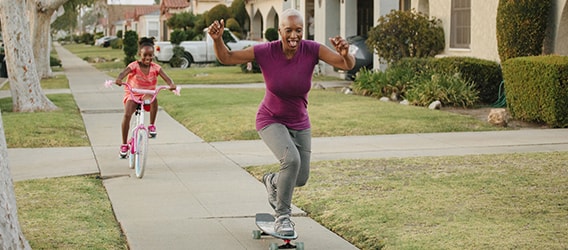How to Find Meaning After Loss or Trauma with Sheryl Sandberg & Adam Grant
After loss or trauma, we all hope to bounce back. Some of us manage to bounce forward. Learn how helping others gives our suffering meaning, allowing us to grow from the most difficult experiences of our lives.
SHERYL: Dave was incredibly giving. At the funeral Zander Lurie, our friend, actually asked everyone, he said “Raise your hand if Dave Goldberg gave you a piece of advice, did something that changed the trajectory of your career, or changed you in some way.“ And hundreds of hands went up.
SHERYL: That made me realize that I couldn’t undo the tragedy of Dave’s death, but maybe, just maybe, there could be some meaning from it, that some good could come from it.
Option B Finding Meaning with Sheryl Sandberg and Adam Grant Authors of Option B
ADAM: When people face traumatic events, early on many psychologists thought there were two possibilities. One was to be broken, to walk away with post-traumatic stress disorder or debilitating depression, or really have difficulty functioning.
ADAM: The other possibility was to bounce back. To return to the place that you were before. What psychologists learned through that research was that there’s a third possibility, that in some ways people are not just able to bounce back. They’re able to bounce forward, to grow from the most difficult experiences of their lives.
We can bounce forward after experiencing loss or hardship
ADAM: After September 11, applications to Teach for America tripled, and many of the people applying said they wanted to serve others. They realized how precious life is and they wanted to do something to help the next generation.
ADAM: When people go through hardship, they’re not just more motivated to help others in many situations. They often want to help people in exactly the way that they have been hurt. Helping people through the trauma that you’ve faced is not only something that gives your life meaning, it gives your suffering meaning.
Helping others in similar situations gives our suffering meaning
SHERYL: One of the many unbelievable stories of resilience we tell in the book is a man named Joe Casper. And he’s a physician and so he deals with life and death all the time, but then his own son got diagnosed with a rare disease that was fatal and he knew it.
ADAM: He came up with this idea that he called co-destiny. When you lose someone who is very close to you, you can do good in that person’s name and it becomes an extension of their life. It becomes part of their legacy.
Co-Destiny: Doing good in a person’s name can become part of their legacy
SHERYL: If Option B can help anyone even a little bit, get through a crisis, or help someone help a friend, then it becomes part of Dave’s legacy and honors the life that he lived.





